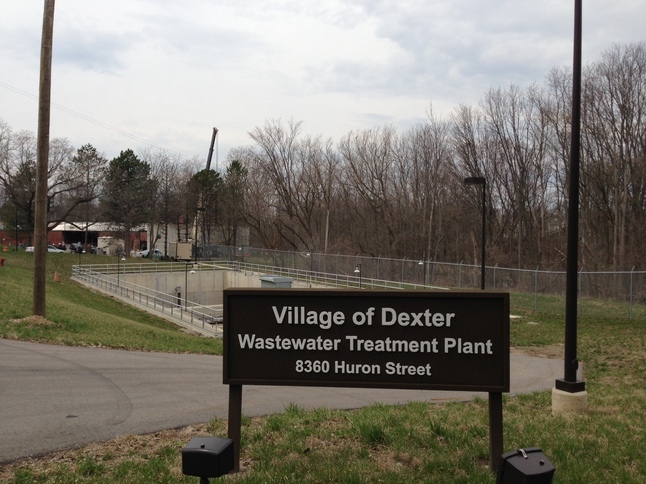New Jersey tops the list of states losing people in masses. It is the state of corrupt cops, corrupt government and corrupt judiciary. Because of the mass exodus of wealthy residents (as they try to avoid the onerous New Jersey Estate Tax), the corrupt New Jersey government allowed tens of thousands of illegals and middle eastern Muslims and Africans to flood the state.
Here are the top 10 states people are moving from
Jan 20, 2017 | By Rosalie L. Donlon, PropertyCasualty360.com
 Knowing the states that people are moving out of can help insurance agents and brokers plan for the potential loss of clients who relocate to another state. (Photo: iStock)
Knowing the states that people are moving out of can help insurance agents and brokers plan for the potential loss of clients who relocate to another state. (Photo: iStock)
Americans are a mobile population, generally comfortable with the idea of moving away from their childhood homes for college, jobs, new ventures or to be closer to family. Some people in the military or corporate jobs have moved as often as every two years.
Knowing the states that people are moving out of can help insurance agents and brokers plan for the potential loss of clients who relocate to another state. It can also help those agents and brokers provide the best information available to their clients as they transition from one state to another.
Related: Here are the top 10 states people are moving into
It’s important for insurance agents and brokers to review moving patterns because when large numbers of people move away from an area, the situation has a ripple effect on the city or state’s economy. Marginal small businesses — which often make up a majority of a small agency’s clients — could go under from a lack of customers, resulting in one less client for the agency.
United Van Lines, based in Fenton, Missouri, which moves people locally, nationally and internationally, has been tracking which states people are moving to and from for 40 years. They also survey their customers to understand why they’ve chosen to relocate from one state to another.
“This year’s data clearly reflects retirees’ location preferences,” said Michael A. Stoll, economist, professor in the Department of Public Policy at the University of California, Los Angeles. “We are seeing more retirees than ever decide to relocate, and as a result, new retirement hubs are popping up in Western and Southern states. Interestingly enough, these retirees are leaving at such a fast pace that the movement of millennials to urban areas is being overshadowed.”
Here are the top outbound states of 2016, according to United Van Lines’ survey:

The Liberty Bell in Liberty Bell Center in Independence National Historical Park. (Photo: iStock)
10. Pennsylvania
The role that the Commonwealth of Pennsylvania had to play in the American Revolution and the early years of the U.S. is generally what most people think of when they think of the state, with visions of the Liberty Bell, Independence Hall and Benjamin Franklin.
Total shipments in and out of state: 6,868
Total shipments out of state: 3,829
Percent of total shipments: 55.8 percent
Related: When a workers’ comp case turns into a minefield of litigation
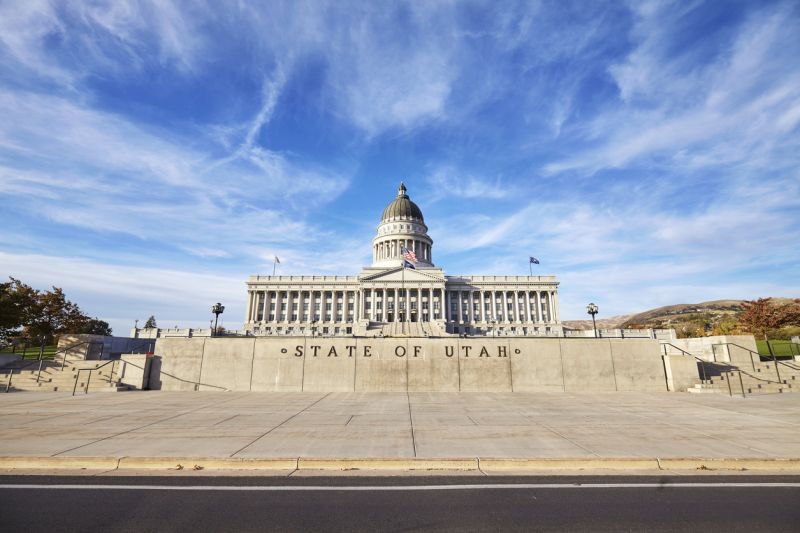
The Utah State Capital building in Salt Lake City. (Photo: iStock)
9. Utah
Although closely identified with the Mormon Church, Utah is also home to beautiful scenery and is well known for its ski resorts — a significant factor in its selection to host the 2002 Winter Olympics.
Total shipments in and out of state: 2,094
Total shipments out of state: 1,172
Percent of total shipments: 56.0 percent
Related: 15 cities with the best-paying cybersecurity jobs

The Rock & Roll Hall of Fame located in Cleveland, Ohio. (Photo: iStock)
8. Ohio
Few states bring to mind the Midwest as much as Ohio does, with a mix of manufacturing (steel, autos and appliances) and agriculture, as well as Ohio State University and its celebrated football team. Bordered on the north by Lake Erie, the state’s economy also includes shipping and transportation.
Total shipments in and out of state: 7,049
Total shipments out of state: 3,995
Percent of total shipments: 56.7 percent
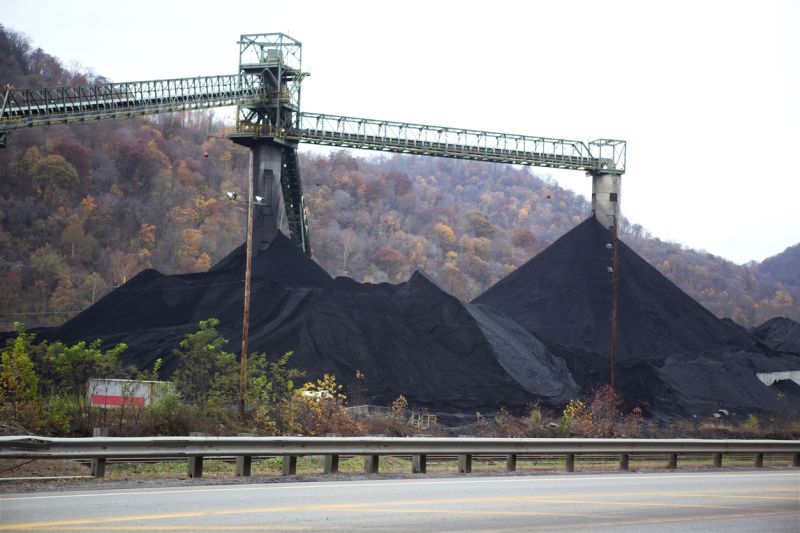
A coal mine in West Virginia. (Photo: iStock)
7. West Virginia
Most people picture coal mines and rural poverty when they think of West Virginia. The state has added chemicals and biotech to its economy, and several federal agencies have established back-office operations there, including the Federal Bureau of Investigation’s Criminal Justice Services Division and the U.S. Department of the Treasury’s Bureau of the Public Debt.
Total shipments in and out of state: 547
Total shipments out of state: 314
Percent of total shipments: 57.4 percent

Main entrance to Churchill Downs in Louisville, Kentucky, where the Kentucky Derby is held annually on the first Saturday in May. (Photo: iStock)
6. Kentucky
Probably best known for the Kentucky Derby, the state also has a reputation for tobacco farms and the start of the KFC (Kentucky Fried Chicken) fast-food chain. It’s also known for bourbon, bluegrass music and horse farms.
Total shipments in and out of state: 2,919
Total shipments out of state: 1,704
Percent of total shipments: 58.4 percent

A misty sunrise over a wheat field in Kansas. (Photo: iStock)
5. Kansas
Who can forget Dorothy’s famous line in The Wizard of Oz: “Toto, I’ve a feeling we’re not in Kansas anymore.” From the movie, Kansas evokes family farms, rolling wheat fields and tornados. Its economy is still heavily agrarian.
Total shipments in and out of state: 2,329
Total shipments out of state: 1,388
Percent of total shipments: 59.6 percent
Related: 4 options to consider when adjusting HVAC hail claims

Classic New England church in Connecticut. (Photo: iStock)
4. Connecticut
One of the original 13 colonies, many of Connecticut’s towns could be the backdrop for a Norman Rockwell painting of the town green and Congregational Church with its white steeple or the setting of “Moby Dick” in Mystic. Although the defense industry in the state is fading, it’s still home to several large insurance companies and Yale University, one of the top three in the U.S.
Total shipments in and out of state: 3,076
Total shipments out of state: 1,849
Percent of total shipments: 60.1 percent
Related: 10 richest states in America

Niagara Falls at sunrise, on the American side. (Photo: iStock)
3. New York
The state of New York, with a population of almost 20 million, ranges from the Big Apple of Manhattan to Niagara Falls on the Canadian border, with cities and towns of all sizes in between. The economy as well has a broad range from agriculture to the financial services found in Wall Street.
Total shipments in and out of state: 8,846
Total shipments out of state: 5,554
Percent of total shipments: 62.8 percent

View of Wacker Drive and train in Chicago, Illinois. (Photo: iStock)
2. Illinois
Illinois is another state that ranges from sophisticated Chicago at the tip of Lake Michigan to worn out coal towns in the south and farming communities in between.
Total shipments in and out of state: 8,782
Total shipments out of state: 5,521
Percent of total shipments: 62.9 percent

Beach boardwalk in New Jersey. (Photo: iStock)
1. New Jersey
A state with 130 miles of beautiful Atlantic seashore, New Jersey is also home to a number of musicians including the late Frank Sinatra, Bruce Springsteen and Jon Bon Jovi. It has a diverse economy and culture, from the sophisticated New York City suburbs, to Atlantic City, to Princeton University, to the vegetable farms known.
Total shipments in and out of state: 5,489
Total shipments out of state: 3,471
Percent of total shipments: 63.2 percent
Here are the top 10 states people are moving from
Jan 20, 2017 | By Rosalie L. Donlon, PropertyCasualty360.com
 Knowing the states that people are moving out of can help insurance agents and brokers plan for the potential loss of clients who relocate to another state. (Photo: iStock)
Knowing the states that people are moving out of can help insurance agents and brokers plan for the potential loss of clients who relocate to another state. (Photo: iStock) Americans are a mobile population, generally comfortable with the idea of moving away from their childhood homes for college, jobs, new ventures or to be closer to family. Some people in the military or corporate jobs have moved as often as every two years.
Knowing the states that people are moving out of can help insurance agents and brokers plan for the potential loss of clients who relocate to another state. It can also help those agents and brokers provide the best information available to their clients as they transition from one state to another.
Related: Here are the top 10 states people are moving into
It’s important for insurance agents and brokers to review moving patterns because when large numbers of people move away from an area, the situation has a ripple effect on the city or state’s economy. Marginal small businesses — which often make up a majority of a small agency’s clients — could go under from a lack of customers, resulting in one less client for the agency.
United Van Lines, based in Fenton, Missouri, which moves people locally, nationally and internationally, has been tracking which states people are moving to and from for 40 years. They also survey their customers to understand why they’ve chosen to relocate from one state to another.
“This year’s data clearly reflects retirees’ location preferences,” said Michael A. Stoll, economist, professor in the Department of Public Policy at the University of California, Los Angeles. “We are seeing more retirees than ever decide to relocate, and as a result, new retirement hubs are popping up in Western and Southern states. Interestingly enough, these retirees are leaving at such a fast pace that the movement of millennials to urban areas is being overshadowed.”
Here are the top outbound states of 2016, according to United Van Lines’ survey:

The Liberty Bell in Liberty Bell Center in Independence National Historical Park. (Photo: iStock)
10. Pennsylvania
The role that the Commonwealth of Pennsylvania had to play in the American Revolution and the early years of the U.S. is generally what most people think of when they think of the state, with visions of the Liberty Bell, Independence Hall and Benjamin Franklin.
Total shipments in and out of state: 6,868
Total shipments out of state: 3,829
Percent of total shipments: 55.8 percent
Related: When a workers’ comp case turns into a minefield of litigation

The Utah State Capital building in Salt Lake City. (Photo: iStock)
9. Utah
Although closely identified with the Mormon Church, Utah is also home to beautiful scenery and is well known for its ski resorts — a significant factor in its selection to host the 2002 Winter Olympics.
Total shipments in and out of state: 2,094
Total shipments out of state: 1,172
Percent of total shipments: 56.0 percent
Related: 15 cities with the best-paying cybersecurity jobs

The Rock & Roll Hall of Fame located in Cleveland, Ohio. (Photo: iStock)
8. Ohio
Few states bring to mind the Midwest as much as Ohio does, with a mix of manufacturing (steel, autos and appliances) and agriculture, as well as Ohio State University and its celebrated football team. Bordered on the north by Lake Erie, the state’s economy also includes shipping and transportation.
Total shipments in and out of state: 7,049
Total shipments out of state: 3,995
Percent of total shipments: 56.7 percent

A coal mine in West Virginia. (Photo: iStock)
7. West Virginia
Most people picture coal mines and rural poverty when they think of West Virginia. The state has added chemicals and biotech to its economy, and several federal agencies have established back-office operations there, including the Federal Bureau of Investigation’s Criminal Justice Services Division and the U.S. Department of the Treasury’s Bureau of the Public Debt.
Total shipments in and out of state: 547
Total shipments out of state: 314
Percent of total shipments: 57.4 percent

Main entrance to Churchill Downs in Louisville, Kentucky, where the Kentucky Derby is held annually on the first Saturday in May. (Photo: iStock)
6. Kentucky
Probably best known for the Kentucky Derby, the state also has a reputation for tobacco farms and the start of the KFC (Kentucky Fried Chicken) fast-food chain. It’s also known for bourbon, bluegrass music and horse farms.
Total shipments in and out of state: 2,919
Total shipments out of state: 1,704
Percent of total shipments: 58.4 percent

A misty sunrise over a wheat field in Kansas. (Photo: iStock)
5. Kansas
Who can forget Dorothy’s famous line in The Wizard of Oz: “Toto, I’ve a feeling we’re not in Kansas anymore.” From the movie, Kansas evokes family farms, rolling wheat fields and tornados. Its economy is still heavily agrarian.
Total shipments in and out of state: 2,329
Total shipments out of state: 1,388
Percent of total shipments: 59.6 percent
Related: 4 options to consider when adjusting HVAC hail claims

Classic New England church in Connecticut. (Photo: iStock)
4. Connecticut
One of the original 13 colonies, many of Connecticut’s towns could be the backdrop for a Norman Rockwell painting of the town green and Congregational Church with its white steeple or the setting of “Moby Dick” in Mystic. Although the defense industry in the state is fading, it’s still home to several large insurance companies and Yale University, one of the top three in the U.S.
Total shipments in and out of state: 3,076
Total shipments out of state: 1,849
Percent of total shipments: 60.1 percent
Related: 10 richest states in America

Niagara Falls at sunrise, on the American side. (Photo: iStock)
3. New York
The state of New York, with a population of almost 20 million, ranges from the Big Apple of Manhattan to Niagara Falls on the Canadian border, with cities and towns of all sizes in between. The economy as well has a broad range from agriculture to the financial services found in Wall Street.
Total shipments in and out of state: 8,846
Total shipments out of state: 5,554
Percent of total shipments: 62.8 percent

View of Wacker Drive and train in Chicago, Illinois. (Photo: iStock)
2. Illinois
Illinois is another state that ranges from sophisticated Chicago at the tip of Lake Michigan to worn out coal towns in the south and farming communities in between.
Total shipments in and out of state: 8,782
Total shipments out of state: 5,521
Percent of total shipments: 62.9 percent

Beach boardwalk in New Jersey. (Photo: iStock)
1. New Jersey
A state with 130 miles of beautiful Atlantic seashore, New Jersey is also home to a number of musicians including the late Frank Sinatra, Bruce Springsteen and Jon Bon Jovi. It has a diverse economy and culture, from the sophisticated New York City suburbs, to Atlantic City, to Princeton University, to the vegetable farms known.
Total shipments in and out of state: 5,489
Total shipments out of state: 3,471
Percent of total shipments: 63.2 percent






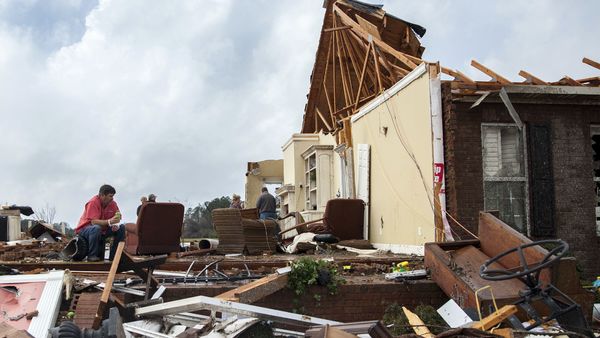 Jeff Bullard, left, sits in what used to be the foyer of his home, Sunday, Jan. 22, 2017, in Adel, Ga. Nathan Deal declared a state of emergency in several counties, including Cook, that have suffered deaths, injuries and severe damage from weekend storms. (AP Photo/Branden Camp)
Jeff Bullard, left, sits in what used to be the foyer of his home, Sunday, Jan. 22, 2017, in Adel, Ga. Nathan Deal declared a state of emergency in several counties, including Cook, that have suffered deaths, injuries and severe damage from weekend storms. (AP Photo/Branden Camp) 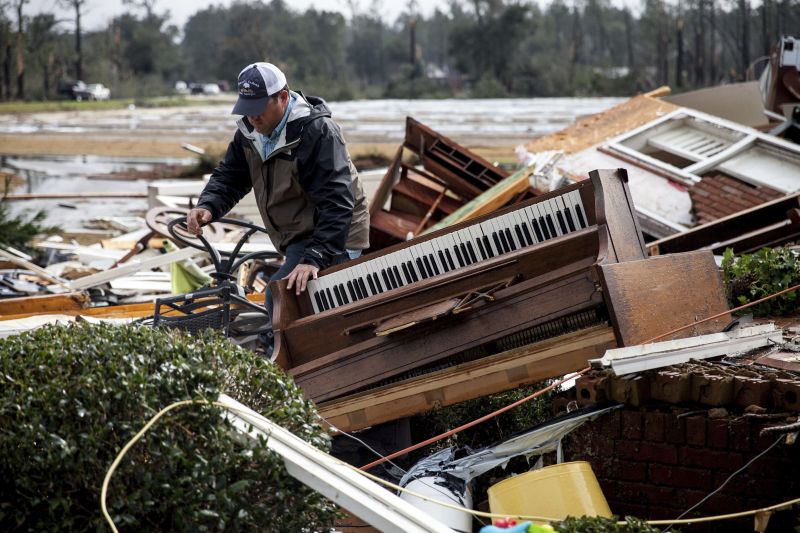 A man walks through debris at a home that was damaged by a tornado, Sunday, Jan. 22, 2017, in Adel, Ga. (AP Photo/Branden Camp)
A man walks through debris at a home that was damaged by a tornado, Sunday, Jan. 22, 2017, in Adel, Ga. (AP Photo/Branden Camp) 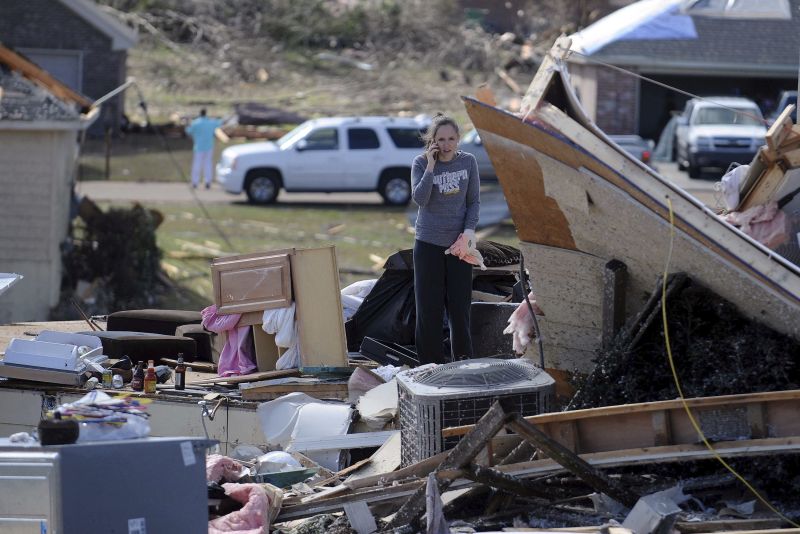 A resident of Petal, Miss., makes a cell phone call as cleanup continues from Saturday's twister that damaged much of the city, Sunday, Jan. 22, 2017. The tornado also destroyed a portion of southern Hattiesburg. (Ryan Moore/WDAM-TV, via AP)
A resident of Petal, Miss., makes a cell phone call as cleanup continues from Saturday's twister that damaged much of the city, Sunday, Jan. 22, 2017. The tornado also destroyed a portion of southern Hattiesburg. (Ryan Moore/WDAM-TV, via AP) 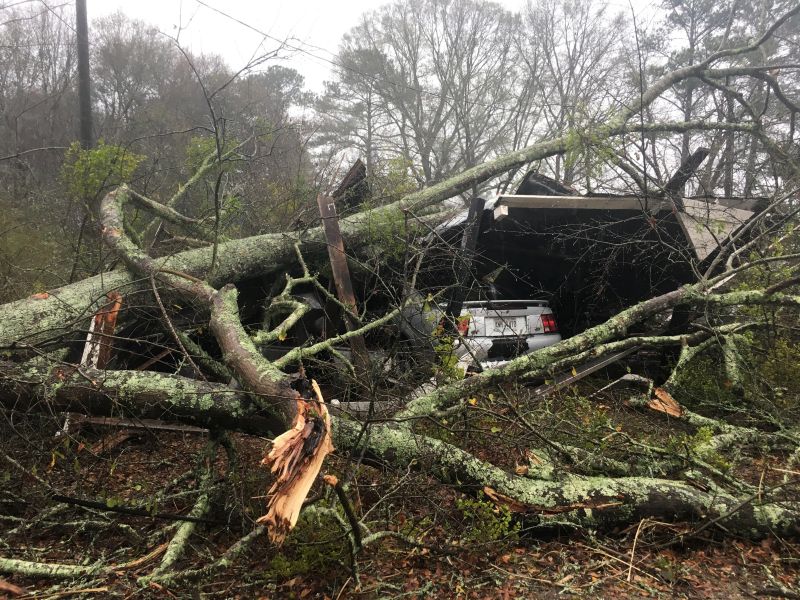 Downed trees rest on a shed and vehicle belonging to Mike Herington damaged near Baxley, Ga., early Sunday, Jan. 22, 2017. The National Weather Service said Sunday that southern Georgia, northern Florida and the corner of southeastern Alabama could face "intense and long track" tornadoes, scattered damaging winds and large hail. (AP Photo/Lewis Levine)
Downed trees rest on a shed and vehicle belonging to Mike Herington damaged near Baxley, Ga., early Sunday, Jan. 22, 2017. The National Weather Service said Sunday that southern Georgia, northern Florida and the corner of southeastern Alabama could face "intense and long track" tornadoes, scattered damaging winds and large hail. (AP Photo/Lewis Levine) 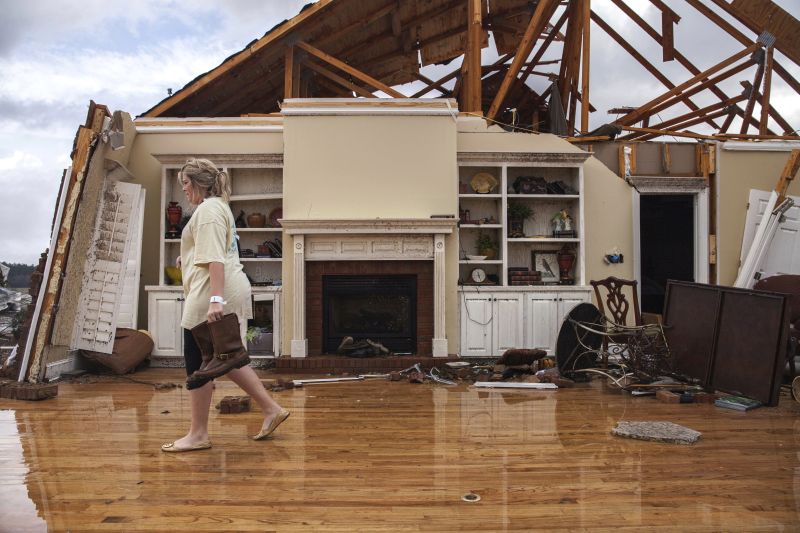 Jenny Bullard carries a pair of boots from her home that was damaged by a tornado, Sunday, Jan. 22, 2017, in Adel, Ga. Gov. Nathan Deal declared a state of emergency in several counties, including Cook, that have suffered deaths, injuries and severe damage from weekend storms. (AP Photo/Branden Camp)
Jenny Bullard carries a pair of boots from her home that was damaged by a tornado, Sunday, Jan. 22, 2017, in Adel, Ga. Gov. Nathan Deal declared a state of emergency in several counties, including Cook, that have suffered deaths, injuries and severe damage from weekend storms. (AP Photo/Branden Camp)  The remains of a house sit in a debris pile along Highway 122 as power line workers repair a downed line Sunday, Jan. 22, 2017, near Barney, Ga. (AP Photo/Phil Sears)
The remains of a house sit in a debris pile along Highway 122 as power line workers repair a downed line Sunday, Jan. 22, 2017, near Barney, Ga. (AP Photo/Phil Sears) 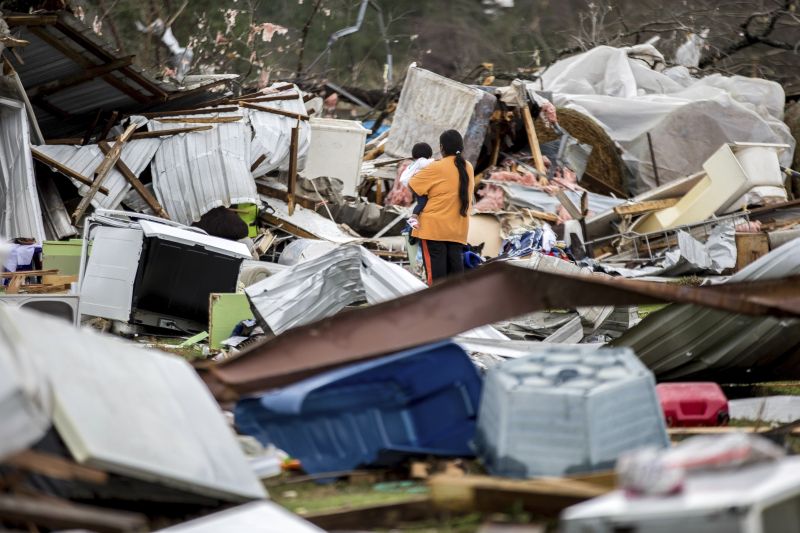 A woman holds a child while walking through a farm that was damaged by a tornado, Sunday, Jan. 22, 2017, in Adel, Ga. (AP Photo/Branden Camp)
A woman holds a child while walking through a farm that was damaged by a tornado, Sunday, Jan. 22, 2017, in Adel, Ga. (AP Photo/Branden Camp) 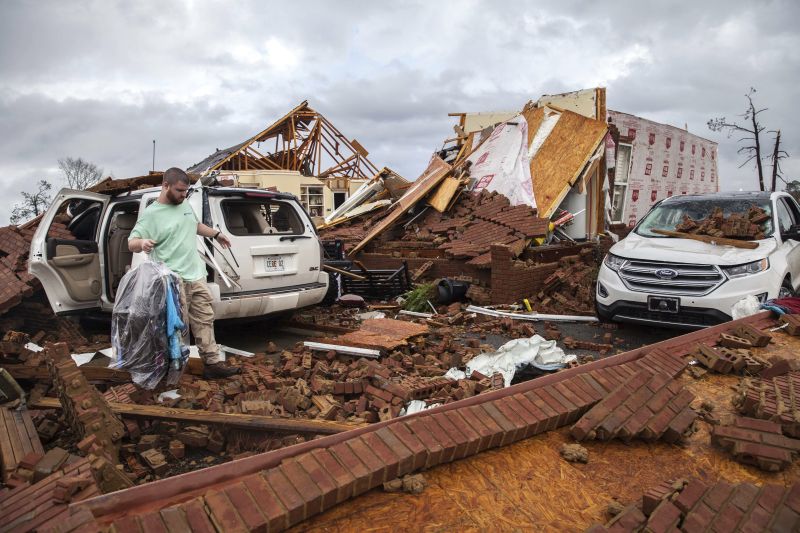 Ren, who only gave his first name, retrieves clothing from a damaged car parked at a home that was hit by a tornado, Sunday, Jan. 22, 2017, in Adel, Ga. (AP Photo/Branden Camp)
Ren, who only gave his first name, retrieves clothing from a damaged car parked at a home that was hit by a tornado, Sunday, Jan. 22, 2017, in Adel, Ga. (AP Photo/Branden Camp) 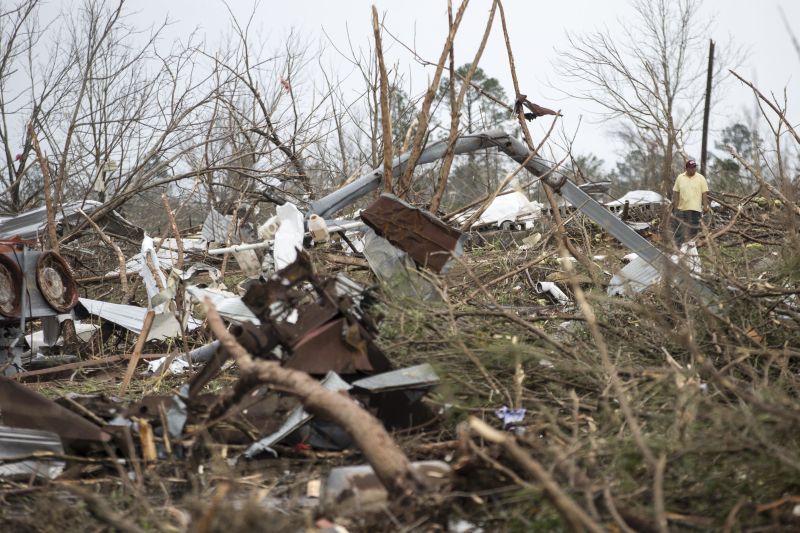 A man walks through a farm that was damaged by a tornado, Sunday, Jan. 22, 2017, in Adel, Ga. (AP Photo/Branden Camp)
A man walks through a farm that was damaged by a tornado, Sunday, Jan. 22, 2017, in Adel, Ga. (AP Photo/Branden Camp) 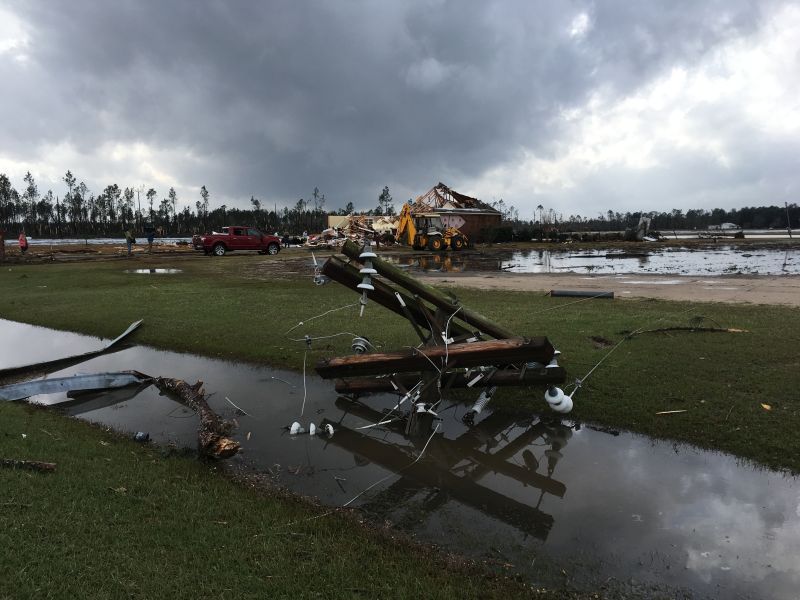 Damage from an apparent tornado Sunday, January 22 at a farm In Cook County, Georgia (AP Photo/Brendan Farrington)
Damage from an apparent tornado Sunday, January 22 at a farm In Cook County, Georgia (AP Photo/Brendan Farrington) 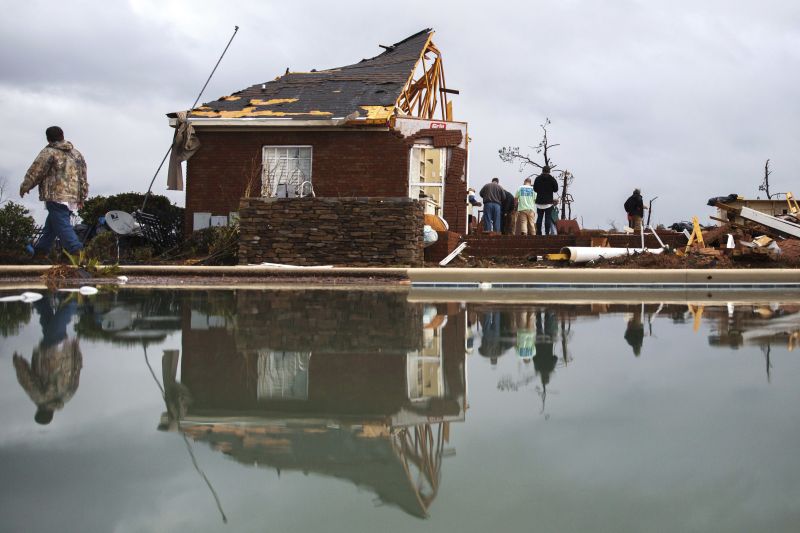 People are reflected in a swimming pool as they work to clean up at a home that was damaged by a tornado, Sunday, Jan. 22, 2017, in Adel, Ga. (AP Photo/Branden Camp)
People are reflected in a swimming pool as they work to clean up at a home that was damaged by a tornado, Sunday, Jan. 22, 2017, in Adel, Ga. (AP Photo/Branden Camp) 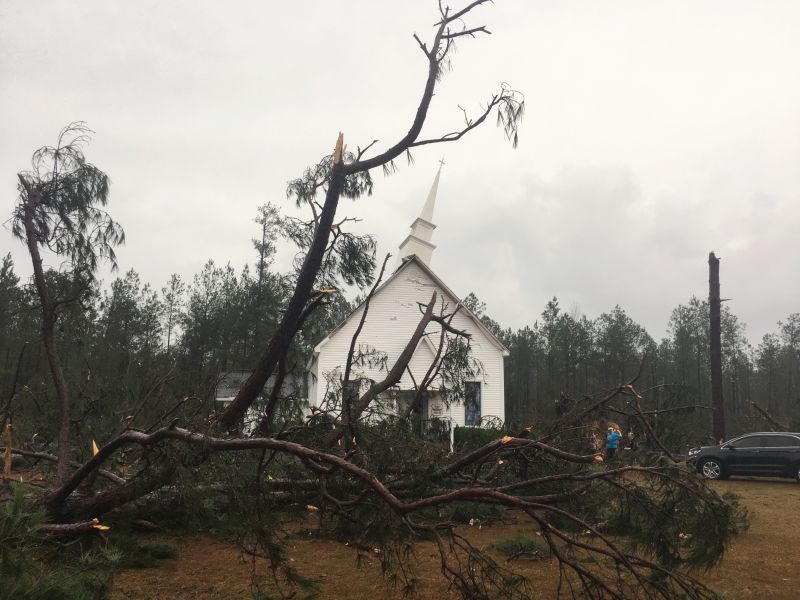 Fallen trees sit near Zoar United Methodist Church that sustained damage to its steeple Sunday, Jan. 22, 2017, near Baxley, Georgia. (AP Photo/Lewis Levine)
Fallen trees sit near Zoar United Methodist Church that sustained damage to its steeple Sunday, Jan. 22, 2017, near Baxley, Georgia. (AP Photo/Lewis Levine) 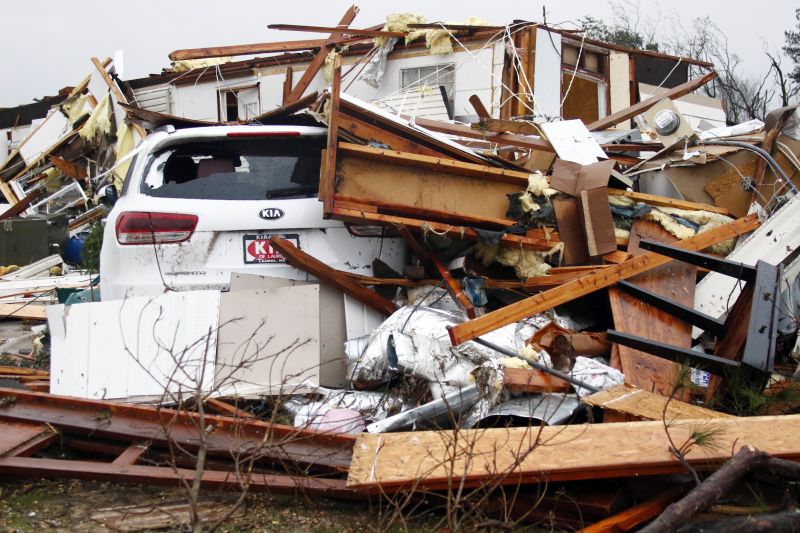 Hardly anything remains of the home of Jessie and Diana Mills of the Pine Grove Community near Magee, Miss., following a direct hit by a possible morning tornado, Thursday, Jan. 19, 2017. Several homes and businesses were affected by the strong winds that blew through several central Mississippi counties. (AP Photo/Rogelio V. Solis)
Hardly anything remains of the home of Jessie and Diana Mills of the Pine Grove Community near Magee, Miss., following a direct hit by a possible morning tornado, Thursday, Jan. 19, 2017. Several homes and businesses were affected by the strong winds that blew through several central Mississippi counties. (AP Photo/Rogelio V. Solis) 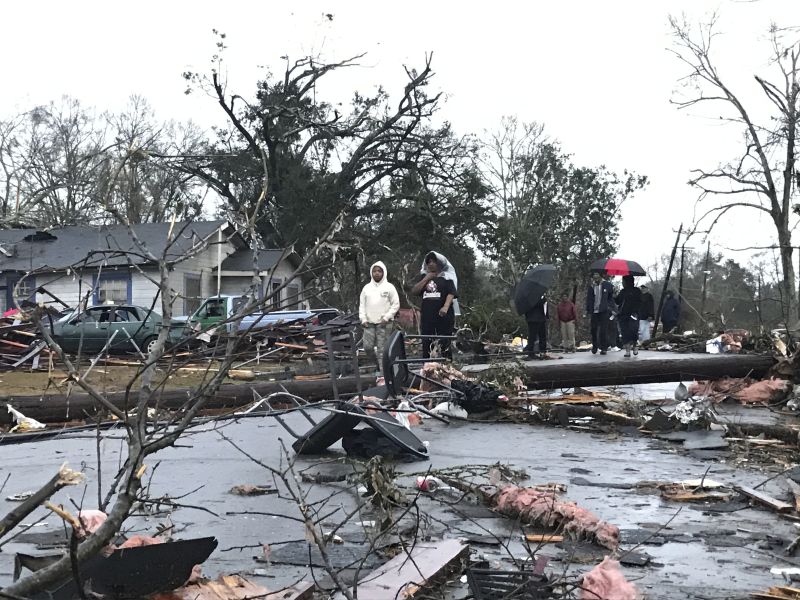 Trees and debris cover the ground after a tornado tornado ripped through the Hattiesburg, Miss., area early Saturday, Jan. 21, 2017. Mayor Johnny DuPree has signed an emergency declaration for the city, which reported "significant injuries" and structural damage. (Ryan Moore/WDAM-TV via AP)
Trees and debris cover the ground after a tornado tornado ripped through the Hattiesburg, Miss., area early Saturday, Jan. 21, 2017. Mayor Johnny DuPree has signed an emergency declaration for the city, which reported "significant injuries" and structural damage. (Ryan Moore/WDAM-TV via AP) 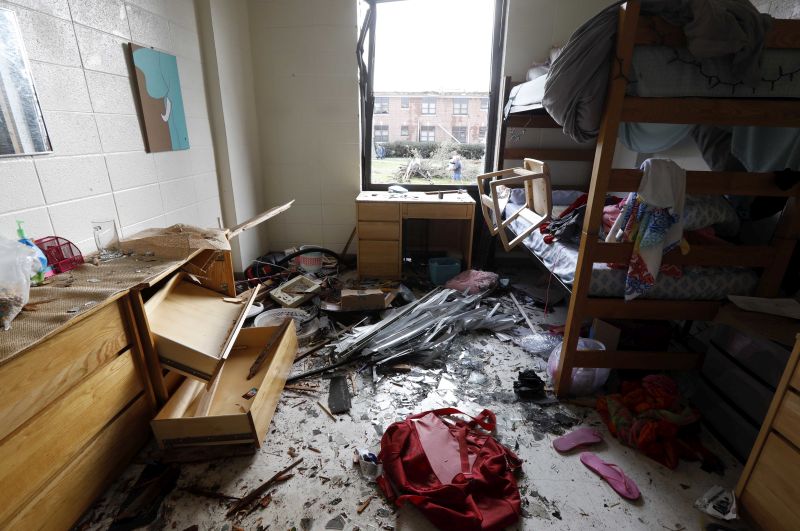 Students that were in the dorms pulled all their undamaged possessions their rooms as cleanup began at William Carey University in Hattiesburg, Miss., following an early morning tornado blew through, Saturday, Jan. 21, 2017. Four people were killed by the twister that hit south Hattiesburg, as roofs were ripped from homes and churches, and trees were torn from the earth. (AP Photo/Rogelio V. Solis)
Students that were in the dorms pulled all their undamaged possessions their rooms as cleanup began at William Carey University in Hattiesburg, Miss., following an early morning tornado blew through, Saturday, Jan. 21, 2017. Four people were killed by the twister that hit south Hattiesburg, as roofs were ripped from homes and churches, and trees were torn from the earth. (AP Photo/Rogelio V. Solis)






